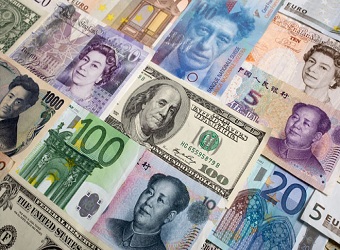The dollar slid on Wednesday and the perceived safe-haven yen gained after U.S. President Donald Trump abruptly fired FBI Director James Comey in a move that shocked Washington and piqued investors’ aversion to risk.
Comey had been leading his agency’s investigation into alleged Russian meddling in the 2016 U.S. presidential campaign and possible collusion with Trump’s campaign. Democrats immediately accused Trump of having political motives.
Any U.S. political uncertainty tends to weigh on the dollar, as a divided Congress could derail Trump’s promised tax reform and stimulus steps.
The dollar index, which tracks the greenback against a basket of six major currencies, slipped 0.2 percent to 99.415, moving away from Tuesday’s three-week high of 99.688.
“The Comey news is being treated as a risk-off event, and the headlines were sparking the dollar’s move down,” said Bart Wakabayashi, branch manager for State Street Bank and Trust in Tokyo.
“The ‘Trump trade’ lifted the dollar after the election, but now we have to see if he can deliver on all of his promises,” Wakabayashi said.
Lower U.S. yields also pressured the dollar. The benchmark 10-year U.S. Treasury yield slipped to 2.388 percent in Asian trade, down from Tuesday’s U.S. close of 2.407 percent.
It had scaled five-week peaks overnight, as interest rate futures priced in close to a 90 percent chance that the U.S. Federal Reserve will raise interest rates again at its next meeting in June.
The dollar dipped 0.2 percent against its Japanese counterpart to 113.74 yen, below its overnight high of 114.325, which was its highest since March 15.
Rekindled fears that North Korea could be gearing up for another weapons test also underpinned the yen.
“In the early morning hours of Asian trade, the yen started to strengthen, and it could have been the reaction of overseas markets to a North Korean diplomat’s comments,” said Mitsuo Imaizumi, Tokyo-based chief foreign-exchange strategist for Daiwa Securities.
In an interview with Sky News on Tuesday, Pyongyang’s ambassador to the UK, Choe Il, said North Korea is ready to conduct a sixth nuclear test. Strategists have said such a test was likely at some point in the future, but the remarks reminded markets that military tensions could escalate at any time on the Korean peninsula.
South Korea’s newly elected liberal leader Moon Jae-in, who will be sworn in on Wednesday, is expected to try to engage Pyongyang with dialogue and aid, breaking from his predecessor’s hardline policies.
“With this in the background, as well as the present uncertainty in the U.S., the dollar will trade heavily today below the 114-yen level,” Imaizumi said.
The euro slipped 0.1 percent against the yen to 123.60, moving away from Monday’s one-year high of 124.58.
Bank of Japan Governor Haruhiko Kuroda refrained from commenting on the exchange rate during a lower house fiscal and monetary policy committee meeting on Wednesday, but said a weak yen would help raise Japanese prices this fiscal year.
Kuroda said he was not currently thinking about ways to change the BOJ’s present policy mix.
The euro added 0.2 percent to $1.0895, edging back toward a six-month high of $1.1024 hit on Monday, after centrist Emmanuel Macron’s victory in the French presidential election on Sunday.
European Central Bank chief Mario Draghi is scheduled to speak at the Dutch House of Representatives later on Wednesday. Investors will be waiting to see if he alters his dovish tone in light of recent strength in the euro zone economy.
Source: Reuters


